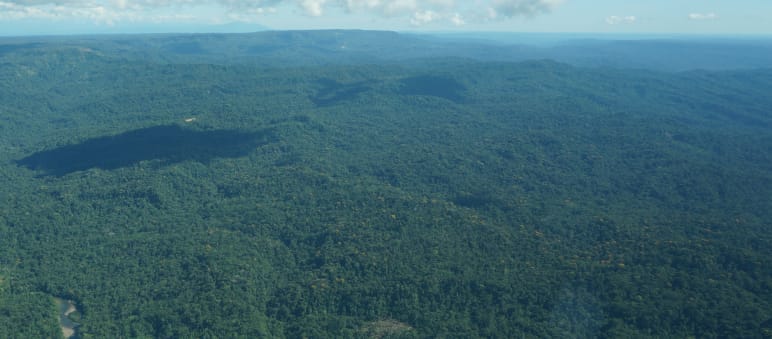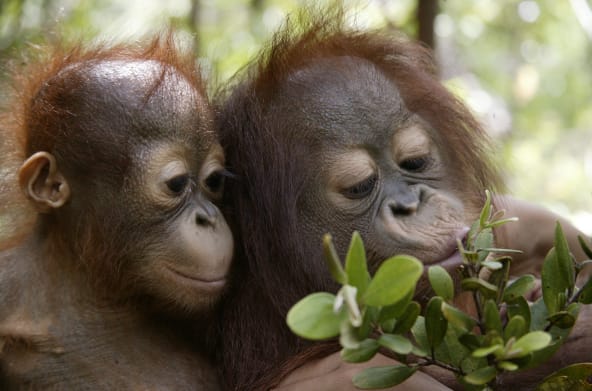
Ecuador: The Sápara people reclaim 251,503 hectares of rainforest
In 2021, the indigenous Sápara people of Ecuador were on the verge of losing 70 percent of their territory: Fraudsters backed by government officials had the land signed over to allow a Chinese oil company to drill there. With the support of Rainforest Rescue, the Sápara have now regained the title to their land after months of legal battles.
The Sápara people are an endangered indigenous minority in the Amazon region of Ecuador. In 2009, their traditional land in the rainforest of Pastaza province was officially recognized and demarcated as a 376,300-hectare territory held by their association, Nacionalidad Sápara de Pastaza Ecuador (NASE).
However, there is oil in the ground under their rainforest, and the Ecuadorian government and international oil companies are after it. Without consulting the inhabitants, the oil ministry divided large parts of the Amazon rainforest into concessions and auctioned them off to companies from all over the world.
The territory of the Sápara includes the oil concession blocks 79 and 83, which were auctioned off in the 11th round of bidding for oil in 2012 under then President Rafael Correa. Correa promised the South American country prosperity in a "new oil age" based on revenues from the extraction and export of crude oil.
Andes Petroleum Ecuador Ltd. – a Chinese company belonging to the state-owned oil companies China National Petroleum Corporation (CNPC) and China Petrochemical Corporation (SINOPEC) – was awarded the concessions on the Sápara's land.
The Sápara reject oil drilling
To obtain the necessary consent of the indigenous peoples as the rightful owners of the affected land areas, the oil ministry relied on bribes: The Sápara leaders were offered millions of dollars to agree to oil deals once the extraction on their territory began.
"The ministry did not expect the indigenous villagers in the rainforest to do everything in their power to resist the invasion by the oil industry," reports Felipe Bonilla of Acción Ecológica in Quito, an environmental organization that supports the Sápara.
To date, Andes Petroleum has not been able to enter the Sápara's rainforest. The indigenous people see no room for dialogue on this issue – neither with the oil companies nor with the government.
Land grab to provide access to oil industry
And thus – as far as the events can be reconstructed – a group of people devised an unscrupulous plan in collusion with officials from the agriculture ministry: They founded an association that claimed to represent the interests of the Sápara and to be the rightful owner of 251,503 hectares of their ancestral lands.
In February 2020, the ministry quietly granted the request to "correct" the names of the owners in the 2009 land registry files, handing them over to the association. To gain support locally in the Sápara villages, the people offered land in the city and tried to take over the administration of social and government programs that benefit the Sápara.
The fraud was only uncovered one year later, after the leadership of NASE – the legal association of the Sápara – had difficulty in officially registering the management of the organization in rotation, an action requiring a court order. In May 2021, the news that the territory had been transferred to an illicit association of outsiders came as a severe shock to Nema Grefa, the elected NASE chairwoman.
The Sápara sue the Ecuadorian state
NASE had no choice but to take legal action against the agriculture ministry for violating the constitutional rights of indigenous peoples and nations. The constitution of Ecuador states that indigenous territories are "immutable, inalienable, unseizable and indivisible". The state had also failed to respect the indigenous peoples' internationally guaranteed right to free, prior and informed consultation and consent.
On October 18, 2021, a court in Puyo upheld the constitutional claim and returned the disputed territory to the Sápara. However, due to legal and administrative loopholes, NASE had to repeatedly apply for the correction of the ownership structure, so that only now, months later, the area is finally registered in its name again.
Rainforest Rescue has been backing NASE in defending its territory since 2021. With our support, the Sápara have been able to hold numerous meetings, organize and strengthen their association, conduct negotiations, pay for travel and cover the cost of legal action.
Luzuriaga, M. (2017). INVERSIONES CHINAS EN ECUADOR: Andes Petroleum y los Bloques 79 Y 83, p. 17: https://grefi.info/wp-content/uploads/2017/02/INVERSIONES-CHINAS-EN-ECUADOR-CDES-2.pdf
